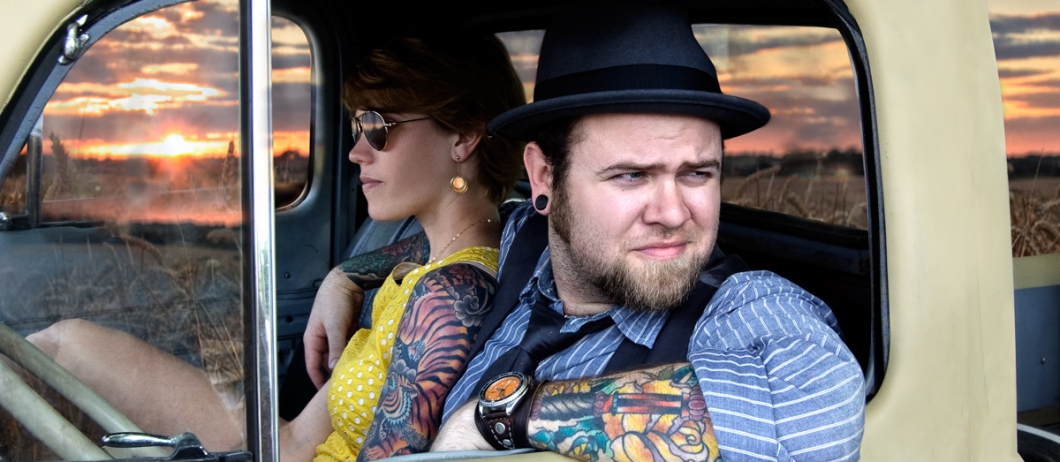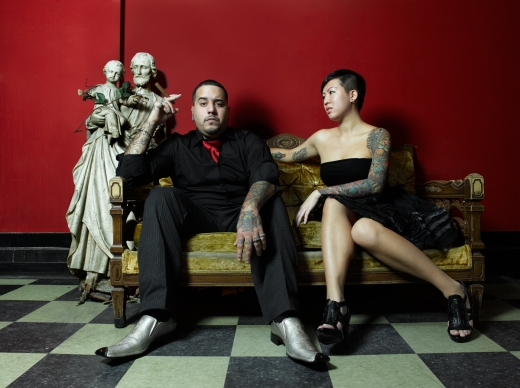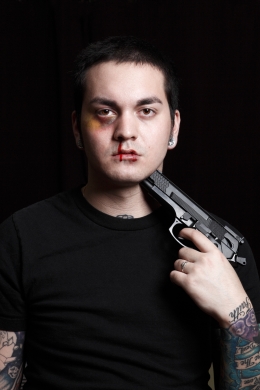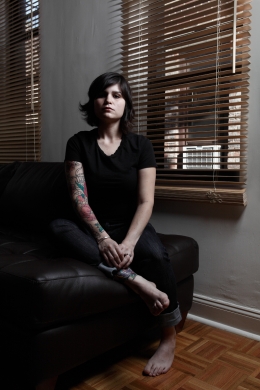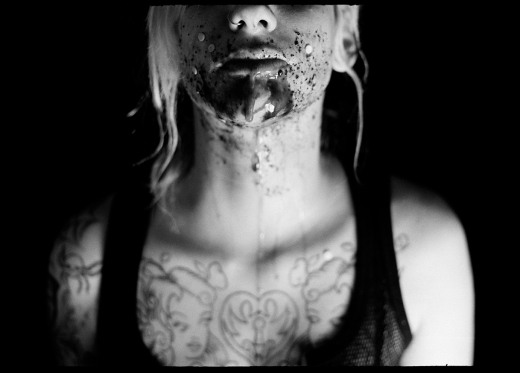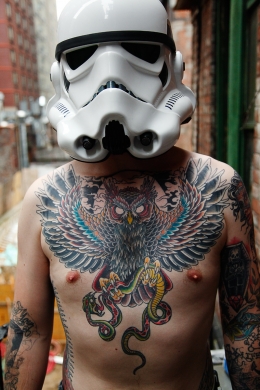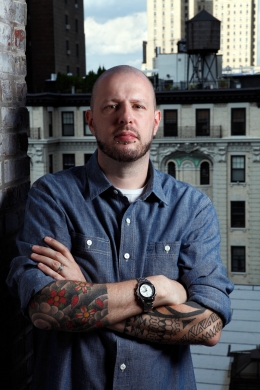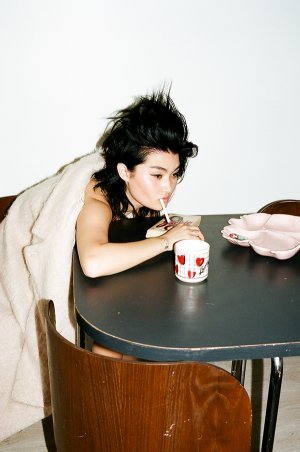Phil Moy–fanboy, musician, and one of NYC’s hottest photographers–has just come off quite the busy 2010, complete with a self-published book and photo exhibition, Buckets Off, as well as a handful of group showings: Sexual Healing, En Garde for Charity, Visions of the Empire, to name a few. What’s most surprising is how he conciliates that with his in-between day-job working in the commercial photography industry
Luckily for us, Mr. Moy was able to take time out of his busy schedule to sit down and chat with NYBA about his craft, tattoo culture, and the reality of an Austin Powers photo-shoot.
“ I’m a cynic and a loner, not because I want to be, but because the world has gone mad and I have to be —Philip Moy ”
Can you recall your first experience with photography? And when you knew Philip Moy was destined to be behind the lens?
Aside from disposable Kodak cameras from CVS when I just took pictures of me and my friends getting drunk at the beach, my first experience with a camera where I felt an immediate connection was when I was walking around downtown D.C. with my roommate. In tote was my Dads old Nikomat 35mm camera that he gave me that I unknowingly loaded with some grainy ass black and white film, which also took me about a half an hour to load, and we walked around and just took photos of each other. Of course I didn’t realize what I had captured until after I had developed it for the first time in the darkroom that evening. So I guess the actual moment I fell in love, was when I watched my photo appear in the developer.
Digital or Film? And what are the advantages and disadvantages of both?
When I was in college I was hardcore into film. You couldn’t pay me to switch to digital. There is something so unique and amazing about working in the darkroom late at night and into the next morning, smelling the chemicals and listening to the sounds of water in the dark. You really learn to work with your hands while trying to work out the best exposure for your prints. You learn to judge the light just right. One of the things that will always keep me longing for the wet darkroom would have to be that moment when the latent image starts to develop right in front of your eyes. This story has somewhat of a sad ending though.Working with film is expensive, and sadly, I just ran out of money. Digital was pretty much forced on me whether I liked it or not. Fortunately it grew on me. There still is no contest between digital and film. Film has a look of its own and is hands down far superior in density and richness than digital. But digital has also come a long way in recent years. Even if you shot film it was getting scanned into computers to be retouched digitally in some way or another. Image manipulation was much easier to accomplish digitally rather than with film. The entire industry was changing and switching over to digital and you basically had to either get on board or get left behind. I find myself very conflicted about the film vs digital issue, because I feel almost as if the “art” of photography has also been left behind. Now, anyone can purchase a high end digital SLR or medium format camera and can just snap away until it looks right or can correct it later in Photoshop. Everybody is now a “photographer” with “professional gear”. It makes it incredibly hard to differentiate between the talented and trained and the person who just bought his digital camera on Amazon and pirated Photoshop from his buddy and doesn’t know jack shit about any of it.
So for me, the whole thing has been bittersweet. On the one hand I am thrilled that everyone can partake in the enjoyment of taking great quality photos digitally, but the other more cynical side of me, believes that it has not only cheapened the art of photography, but professional photographers themselves.
You mentioned you sort of had digital photography forced upon you, for better or for worse, because of a multiple of circumstances. This question is sort of far-reaching and out there, but, as you are a professional in the field of photography, do you see the equipment, or medium of photography changing as drastically from film to digital in the near future?
It has already happened. Nobody in the commercial photography world shoots film anymore and if they do, it is not only financial burden but also a huge time consumer; two things the photo industry in general does not want to deal with anymore than they already have to. Time is money and Film is slow and unpredictable. You have to buy expensive and specific film, shoot, change rolls or whatever, send off to a lab to develop, deliver the processed images, then send it off to be scanned into the computer so a retoucher can edit it, etc etc. Digital is much faster and cost effective. You can shoot tethered to a computer and monitor so a tech can check exposures and make corrections, while the art directors are wireless tapped into the feed making selects on an iPad while copies of hard drives are already being delivered for post-production. The photo industry is ever evolving and if you don’t change with it, you might as well change careers. If you are hell-bent on shooting film and making a living in the commercial photography world – GOOD LUCK!As a self-proclaimed Fanboy – do you feel it is your duty as a photographer to unveil, or unmask, so to speak, this subculture that tickles your fancy?
No, I don’t think it’s my duty to do anything. In fact, sometimes I feel as though I am invading their privacy. This level of fandom is kind of an intimate thing and you never know if you are stepping on someone else’s toes or not by asking them questions about how they got into it or why they do it.In your exhibition and self-published photography book, Buckets Off, you expose the people under those intricate Star Wars get-ups everyone has seen at Star Wars conventions. How did this idea arise? And did you feel dirty uncovering the people beneath the masks?
Fortunately I am part of this community of Fanboys, particularly that of Star Wars, and know a lot of these people. I have gained their trust. They know I am just like them and that I share a passion for the same thing that they do. Because we have that relationship, I feel that they are comfortable with me and know that I respect them enough to make a dignified photo series about them. Buckets Off is a snippet of just a few of the men and women I have met just during my time here in New York City. I wanted to share their awesome stories with whoever was interested. I wanted to make a tribute to these awesome people.How do you start new projects and shooting sessions? Do you keep sketch-books, notebooks, napkins, etc… and plan out as much as you can before you start clicking the exposure button, or do you let art take control over you when you are shooting?
My thought process when coming up with piece is a strange one. I like the draw on my own experiences a lot of the time such as phases of my life, things that I am feeling and going through, but also drawing a lot from dreams I have had. I have a notebook that I make little sketches and write down words in. By the time I am finished with one it looks like a maniac’s coloring book, which I think is cool as shit; Creepy, but cool as shit. Sometimes I have thought of exactly how I am going to make an image months before I even make them, and by no intervention of my own, come out exactly they way I saw it in my head. Which is kind of bonkers, but it’s a true story. Sometime I get hooked on movies, or time periods or themes and I will build off that.My series Sie Folgen Dem Führer came from an entire summer spent watching WWII documentaries and movies and an ever-growing fascination with psychological warfare. I had come up with this big elaborate back story about these two German soldiers and how they didn’t want to fight and felt like they were there for the wrong reasons and I was going to actually get into my own photograph and play one of them…
Staying on the exposure topic. Do you find yourself snapping the exposure button frequently for a specific shot (like the classic Austin Powers photo-shoot), then pick out the best one once developed? Or are you meticulous in your craft, taking your time for just the perfect shot?
It depends on the shoot. If its one of my meticulously crafted back story fine art portraits, then yes, I take a long time getting it close to exactly what I am looking for. When the shoot is more fashion based, it tends to lend itself to a different and faster paced workflow. And yes, I sometimes find myself snapping photos like Austin Powers. Yeah baby! Randy! Haha!Some artists tend to think of their work as a compilation of what people have seen before. Do you feel the same way with photography? If so, would you mind indulging us with some of your influences?
Yeah I feel similarly. It has all been done. No one is taking photos anymore that I’m like, “Holy Shit! That is so new and amazing and no one has ever seen anything like it before!” It almost seems like some aren’t even trying anymore. It is just people making copies of copies, ripping other artists off left and right. Is it wrong? I don’t know. I am no good at judging that kind of stuff. Some of history’s greatest artists ripped off and copied others so it is a tough argument.Me personally, I find inspiration in a lot of different mediums and I just like to make photos that I am happy with and find aesthetically pleasing. I’m not in it to make photos other people are going to like, which is an obnoxious trait for any artist to have in my opinion. Just do what YOU like.
You’ve earned your BFA in photography at the School of Visual Arts (SVA) in NYC. Do you feel this experience has helped enriching your work as a photographer, or do you think you’d be a professional photographer even without gaining the knowledge and experience acquired from this prestigious school?
SVA is a great school, it really is. They have some of the best photo facilities and resources in the country without a doubt, and I have had the privilege of meeting professors there that are some of the most knowledgeable people I have met yet in the industry because unlike a lot of photo schools, these professors are actually in the industry.As far as enriching craft and whether I would be a professional photographer without college schooling is debatable. For me, I needed training to get me started because I didn’t pick up a film camera until I was 21. I actually never had any desire to do photography until I had to take an Intro to Photography as a prerequisite for another major. It was that class that got me hooked. It really solved a lot of my problems. I always wanted to draw people, but I just couldn’t get it right. It was just so much easier to take photos of them! When I was starting out, digital cameras really hadn’t made an impact yet in the Fine Art world of photography, so everything I learned was old school. I don’t even want to know how much chemicals my skin has soaked up from all of those alternative processes and not wearing my safety gloves….
But going to school for an art in general and what you are going to get out of it, is entirely subjective. It is all about what you bring to the table and your willingness to learn, fail and grow. I failed a shit ton, but I loved what I was doing so much that it all eventually worked itself out and I somehow developed my own style. There are also people who are just innately good at certain things and it doesn’t necessarily make them better at what they do just by going to school. They thrive without it. It gives them freedom to experiment. That’s all Art college really is anyway. It is semi-supervised experimentation. A place to try shit out and get feedback from other kids whose opinions you really don’t give a shit about. If anything, it falls on the professors. If you have a professor that takes genuine interest in mentoring you and teaches you the fine art of the craft, well… that is what it was about for me. If you are just going to take photos of your boyfriend jerking off on your bed with a Holga camera, not show up for half the year or give a shit about anyone or anything anybody says, then yeah you might be better off not wasting your parents hard earned money on art school. No… I’m not speaking about anyone I ever met when I was in art school…
You mentioned that you came to photography late, and you also hinted that you wanted to draw people, but found difficulty in translating the reality into the artistic image in your mind. Do you revisit your skills acquired before you came to photography, not just in notebooks, and sketches, but in your photo projects as well?
Honestly not so much. I hardly ever draw or paint anymore. When I switched to photography and digital mediums (ie. Photoshop, indesign, etc) I usually spend the majority of my time on the computer. I find it hard to go back and forth between mediums but that’s partly because I am just out of practice with drawing.I saw that you recently posted a picture on your blog, entitled, “Manhattan this Morning” – and the fog in the image overlooking the NYC skyline is absolutely breathtaking. I know you mostly work as a portrait photographer, so, what similarities do you find in working with people aside
from nature or landscapes?
As an emerging artist in today’s digitalized and modern society, how important do you feel your blog is – and/or other aspects of social networking/media? I also noticed you participate in sticker campaigns – taking your message out to the streets. How important do you feel these forms of social media, although non-paying, are – and how detrimental are they to get your message out to the world through your photography?It’s really weird for me. It’s like I have two different kinds of photo modes. I have my portrait and fine art work that I obsess over which is a very slow and meticulous thing that has back story and requires storyboarding, and then I have my iphoneography (I hate that word, but it is what it is) where I just see things while I am out and about and just snap shots off of things that I like and that interest me. This second type of photography I do I don’t think about it hardly at all. It’s just snap and then done with. I would say this would be more of a personal visual diary of my life and surroundings when I take photos like these. I want to share with people what I am seeing and doing because I think it is important to be an interesting artist as well as have interesting work. Otherwise, who cares? It’s like when you like a band and their music. That’s great and everything, but it’s even more great when you get to meet them or check out their blog and see what their up to. I feel that it is a really important aspect of being an artist. The WORK and the ARTIST together. The artist needs the work and the work needs the artist. It is one single entity.
Your response to blogs, and the realization of Iphonegraphy – it seems as if a blog could become a more visual notebook for the artist, rather than an insight into the creative workings of the artist by the people. Does some of your free-wheelin’ photography in your blogs ever evolve, or help evolve the story in your more elaborate photo projects?
I agree. I think my blog and twitter posts are really both an insight into my life but also a visual diary for myself. I use them as outlets to vent, communicate with other creative’s (network), and to just fulfill my desire to take spontaneous photos that I feel just NEED to be taken and usually have nothing to do with my actual photographic “works”.I also noticed that you have quite a few portraits of tattooed people. Do you find it difficult to do justice to their body art? How do you attack a portrait where there is going to be art not seen in the photograph, while it is there, on the person?
I don’t think there is any good way to photography artwork on someone’s body and do it justice. That tattoo is a part of their body physically and spiritually in a way that a two dimensional image could never capture. But you can definitely capture the essence of that person who got the tattoo and do them justice. I love body art; I think it is an amazing thing. I don’t judge what other people get. To each their own.Since I’ve always liked the aesthetic of tattoos, naturally I wanted to incorporate it into my work. I am never out to photograph someone’s tattoos either. It looks too obvious and unnatural. Nobody is walking around flashing specific tattoos in your face…(well…most of the time they aren’t….) so I don’t want to photograph them like that. I am more interested in photographing the person that is tattooed, I could care less what they actually have tattooed. There is something so interesting and mysterious about a portrait of someone with not a lot of emphasis on the actual art itself.
How do you feel your tattoos represent Phil Moy as a person? If not, any reasons why not?
A lot of my tattoos are about me in some way or another, even the really stupid shit. Getting tattooed for me was like taking my notebooks with all the sketches and words and bringing them to my body. I made myself the sketchbook. It doesn’t read quite as linear as a story, but I could guide you through it and I’d bet you’d find it interesting.You seemed to have quite a bit of exhibitions as well as a couple of self-publications over the past couple of years. What is on your plate for the next year, and what should we keep our eyes peeled for in 2011?
Man I wish I knew! I get really caught up in a lot of projects at once so it’s hard to say. I think I want to get back into doing some more eerie cinematic tableaux’s of some sort. Slightly larger productions with a lot more lights and staging involved. Yeah.. I’m going to be up all night now thinking about it.When you look into your lens, what is the first thing you look for? What is the first thing that grabs your attention?
With my fine art portrait stuff I am interested in composition; where the subject falls in the frame and how the light falls on them. I ask myself if I need to kick in another rim light or a hair light or something. Focus would be the next thing. When I take camera phone snap shots, I am looking for similar things, but since it is so fast its usually just intuition and I don’t revisit it after it is done.What was the oddest thing you had to do for a shoot that you did not foresee going into the session?
There have been more than a couple of odd moments. I think one of the odder ones being when I was trying to verbally explain to a model how I wanted her to be crawling on the floor when she told me to just get down and show her. Then she jumped over me and started spanking me and pretend riding me like a bull…
I know photoshop and other digital photo-editing software is pretty big in the photography world right now. What are your views on these digital enhancements? What elements do you absolutely love about photo-software, and what elements do you despise with a passion?
Photoshop has its uses. Its great for adding contrast, de-saturation and skin retouching, compositing images, but people abuse it real bad. I hate seeing surface blurs and oversaturation or really crappy composites. It makes me nauseous. Like I look at some of these images in magazines and online and it makes me queasy. It’s a fine tuning tool and not designed to make your crappy photo look good just because you threw some filters on there. Damn.Going back to your self-proclaimed Fanboy image – your photographs seem to have a lot of Star Wars references in it, whether in your blog or your Buckets Off project. Do you find these images exposing themselves for you because you are a part of the subculture of fanboyism? Or do you find yourself tirelessly searching for these images/ideas?
They definitely just come to me. I mean, Star Wars is a huge part of my life and always has been since I was a kid. Growing up I didn’t have a lot of friends for any long period of time. It was just my brothers and me and we lived in a foreign country for my parents work and stayed inside most days. We had the original trilogy Star Wars on VHS and our toys. We seriously made these things real replacements for friends that we didn’t have when we were living overseas. So for me personally it has been something that has always been a pretty big part of my adult life as well. I build Star Wars prop replicas in my spare time and collect all kinds of rare toys and artwork. It’s like my homage to my childhood friends and saviors. I went one day not too long ago to take a photo of this guy and he grabbed a Stormtrooper helmet off the shelf that just happened to be on display where we were at, and put it on. It was awesome.Do other forms of art – music, literature, paintings, street-art, etc – influence your photography style? What makes Phil Moy strive to be a better photographer? Likewise, are there things you’ve seen in other mediums that you’ve wished to portray as a photograph?
I am a huge fan of Renaissance and Baroque art. I love it. I’m sure part of it has something to do with living in Italy as a kid, but there is just something so spectacular and unattainable about it, that I will always look at it as the highest form of art. When I go to the National Gallery of Art in D.C. I still have my breath taken away. I would like to think that in some indirect way it is influencing my photography work, but I would never compare my stuff to that level of genius. Work like that really puts art in perspective for me. I guess I quietly carry that elitist view of art around with me when I look at anything be it a building, or a photograph or a street art mural.And I think we’ll end on a more encompassing question. As a professional photographer, what keeps you clicking? Do you find yourself carrying your camera everywhere, or is there just a ‘time and a place’ – a job?
Photography is something that I love and will always be something I do. Fortunately it is also my profession. For me there is a time and a place for my fine art work because it is usually staged and studio lit, but for everything else, I wish I could just blink and take photos with my eyes.After reading your responses to the initial questions – I came to realize that the creative process to tell a story through fiction is quite similar to the creative process in creating an exhibition or photo-collection. So I was wondering, do you view a collection as a story? A certain visual, silent narrative?
Yeah I think all of my work either as a body or series of collected works is basically a silent narrative whether they “go together” or not. All if my work is a story and commentary about me or how I am feeling. I like to think you could pick any random grouping of photos out of my book and the images would still be having a conversation with one another.Since you have suggested an appreciation of body art in society, do you ever think you will try your hand at tattoo artistry?
Funny you should say that because when I was in college I did take an informal tattoo apprenticeship to see if it would be something I might be interested in pursuing. I did run into some obstacles though, like drawing portraits of people and so on. It is also a huge commitment to working with one mentor for years and usually without pay which was something I was not able to do because I had financial obligations that demanded a steady paying job. You also really have to have a great relationship with your mentor in order to get the most out of it, otherwise it’s just not worth it, and I didn’t have a particularly great relationship with the artist. I still think about tattooing someday. Sadly it would just be a matter of having time to sacrifice years of learning and getting little to no pay, which may never come around for me again.

